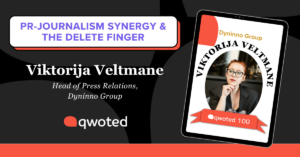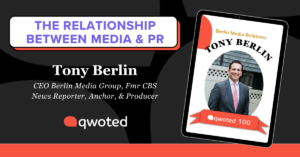Qwoted is committed to exploring the current state of the media by speaking to industry leaders and educating future generations of media professionals. What has social media and technological innovation brought to the table? What can we expect for the future of journalism?
Charles Davis is a reporter-turned-academic, who has been teaching journalism for 25 years. Davis gained experience writing for local newspapers and reporting on financial services for Ireland-based news service Lafferty Publications. He earned his Ph.D. in Mass Communication and has taught future generations of journalists at Georgia Southern University, SMU, and the University of Missouri, prior to his current role as Dean of the University of Georgia’s Grady College of Journalism and Mass Communication. One thing Professor Charles Davis would change about the journalism industry? Its standing with the public. “It’s been bruised and battered by ideologues who are content to ruin it, despite its vital, central importance to democracy,” said Davis.
What are some of the best practices from journalism’s past that you feel need to be utilized now?
CD: Verification is the great differentiator, in my experience, and always has been. It feels as though a whole lot of journalism error can be traced back to its absence. We must renew the teaching of verifying facts, acquiring facts, distinguishing fact from non-fact, etc.
What do you see as some of the current industry’s biggest pitfalls? What gives you hope for the future of journalism?
CD: Predatory capital is a huge problem in newspapers. Hedge funds are stripping once-vital newspapers to the bone. My optimism lies in thinking about what’s next…the organic rise of new models and institutions.
What are you hearing from your students or members about their ambitions and hopes for the profession?
CD: My students are incredibly bright, and generally optimistic. They want to make things — content — and are not concerned about whether it is for a traditional journalism shop or a corporation, non-profit or sports organization.
What advice would you give to aspiring young writers and reporters?
CD: Tell stories and hone your craft. Build a diverse array of skill sets and find the unexplored areas. Take risks while you are young, because it gets harder to do.
What learnings have made a tremendous difference in your career?
CD: I’ve learned tremendous amounts from some of the best in the business in both the press and education. I am indebted to so many wonderful mentors. The biggest difference? Perhaps humility. I have learned, again and again, that I am not the end-all, be-all, that I serve others.


